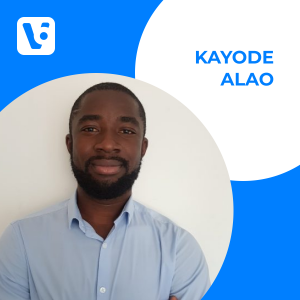“I think whenever you move out of your comfort zone you get triggered, and you really have the opportunity to bring out new ideas.”
Our own COO, co-founder of volvero, Kayode Alao shares with us what brought him to become an entrepreneur, how volvero was founded, the importance of seeing things from a different perspective, the future of mobility and being part of the Forbes BLK community.
5 min read
Could you share with us a little bit more about your entrepreneurial journey?
My entrepreneurial journey started in 2013. I had just moved to South Africa at that time. And back in Nigeria, in my home country, I was doing a lot of corporate work and engineering stuff. When moving to a new country, I realised that I needed to be more interested in something different than the “nine to five”. At that time I was working on a postgraduate programme, but I had an opportunity to also be working in the industry doing some consulting.
My first step into entrepreneurship actually started from there, so I’m not like many people who say they were entrepreneurs since they were two years old. Mine came a little later, in my middle 20s. And at that time, what I saw was there were opportunities to use some of the knowledge I already had to help some companies to make decisions when it came to the design of materials, or the selection of their products. This is how I kickstarted and would eventually run this business, I ran it till 2017. Then I decided to let it go because at that time I’d moved to Italy. And then less than two years later I ran into Marco [Filippi, CEO of volvero], and we started talking about the idea of volvero. It’s been four years now and we’re still working on it.
Do you think that moving to another country actually plays a big role? And why?
I think it does, certainly. In my case I moved to Italy from South Africa without a credit card that worked in Europe, which limited my options in terms of mobility, as well as not living in the city center when I moved to Bologna. I think whenever you move out of your comfort zone you get triggered, and you really have the opportunity to bring out new ideas. You get to see things from a different perspective, and then you also have the real issue that you face. And all this can be leveraged into providing solutions and becoming a business.
I absolutely agree with you, 100%. So what exactly do you think brought you to mobility?
I’d explored things before meeting up with Marco. At that time I was into sustainable development, and that shaped my choices for travel, and other things. Airbnb was a few years old, and the sharing economy was beginning to become something really important. This was what really sparked the idea. We were in Italy, where we had some mobility needs, and we didn’t have enough solutions, or the solutions were very rigid. I couldn’t rent a car because I couldn’t get a credit card. This was one of the issues that became the boilerplate. Mobility limitations were at the forefront of issues, and it was a shared pain point that Marco and myself had also experienced. But the solution wasn’t clear at the beginning. Over 2 years, we pivoted and redesigned the idea and we have maintained the same mindset since then.
In terms of mobility, we now have a lot of sustainable alternatives, a shared economy, but still people keep on buying cars. What do you think the biggest challenges are for mobility now?
First of all, while the sharing mindset has hugely grown in the real estate space, it hasn’t caught up at the same pace in the mobility space. In real estate the building is fixed, it’s not going anywhere. There are still risks, of course, but in the mobility space it’s something that moves, therefore there is a little bit more risk, which is why the acceptance of the sharing economy in the mobility space is growing slower. We have the Gen Z’s who are opinionated against owning and more inclined towards sharing. We also have a very strong group of Millennials who still see cars as a status symbol. Among the risks and the differing mindsets I alluded to above, we provide an insurance solution that cuts away some of these risks, and reduces the way people are perceiving shared mobility, especially from the peer to peer point of view. It’s an in-house solution, built with the support of our insurance partner, Europ Assistance, and Neosurance. So I expect things to move faster, and for people to really get into the sharing economy around mobility.
My next question was going to be well, what’s the dream, the future of mobility, but you answered that already. You were ahead!
I was ahead! But yeah, I think that even our competitors around the world are going through the same issues. But I certainly believe that in 18 months we would move a little bit faster than we have seen. And we are ready to accept that change and how fast and quickly we can innovate to keep our customers happy and engaged.
What do you think volvero does best?
There’s so many things that I think we do best. First of all, we have an amazing team. Whether the people who are still with us, or the alumni, we see them doing amazing things, and the passion that they have. Another thing we are very good at is identifying, preempting and listening to the needs that our customers have. We go in, we roll up our sleeves, and we are very quick in adapting to change and developing innovative solutions.
“I think whenever you move out of your comfort zone you get triggered, and you really have the opportunity to bring out new ideas. You get to see things from a different perspective, and then you also have the real issue that you face. And all this can be leveraged into providing solutions and becoming a business.“
Speaking of talented team members, you have recently received the Forbes BLK certificate of membership, congratulations! Would you like to share with us something about this fantastic achievement?
I’m really excited about this. It’s a really strong community that gives me a foundation where I can share a network with like-minded entrepreneurs who are also doing amazing things all around the world. And I think this is just the first step, we’re going to see a lot more of those benefits coming up. I happened to be in Houston a few weeks ago, and I met up with some of the BLK entrepreneurs there, and we began to talk about partnerships and collaborations. It’s just amazing to see what the community brings, and I’m really excited for it.
Back to volvero for our last question. What would you tell our customers?
I would say, if you find out that there’s something on the app that you don’t like, or that you think we should add, we are readily accessible. Just hit us up! The co-founders have direct access to the emails that we receive, so do not hesitate to drop any feedback. Same thing goes if you think we should come to your community. Right now we are in northern Italy, particularly in Padova, but if you think we should be in your city, reach out to us. We are also looking for partners as well and we would love to hear you out and play around with the idea with you as well. So contact us whenever!
You heard him, folks!
Alice Franzon @volvero




